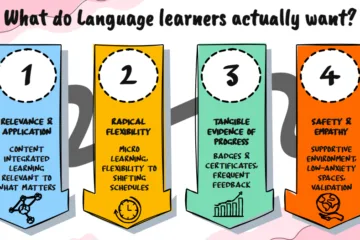When most companies consider corporate language training, they envision formal classroom settings, grammar worksheets, and structured business dialogues. Rarely do they imagine their sales team humming along to English songs whilst unconsciously absorbing pronunciation patterns, vocabulary, and cultural nuances that will enhance their next client presentation.
Yet music represents one of the most powerful and underutilised tools in professional language development. The science is compelling, the results are measurable, and the applications for business teams are remarkably practical.
So what makes music such an effective tool for corporate English language learning? The answer lies in how our brains process rhythm, repetition, and emotional connection—three elements that traditional training methods often struggle to replicate.
The Science Behind Musical Language Learning Actually Works
There’s considerable scientific evidence demonstrating how music helps second language learners acquire grammar, vocabulary, and improve spelling accuracy. The research extends beyond theoretical studies to measurable workplace improvements that directly impact business communication effectiveness.
The so-called “Mozart Effect” illustrates how listening to music boosts performance in mental tasks, including language acquisition. For corporate teams, this translates into more efficient training sessions and faster skill development that fits within busy professional schedules.
At The Chat Laboratory, our professional tutors integrate musical elements into business English programmes precisely because the neurological benefits accelerate learning outcomes. When teams engage with English through music, they’re simultaneously developing listening comprehension, pronunciation accuracy, and cultural awareness—three critical components of effective international business communication.
The effectiveness becomes particularly evident in pronunciation training. Traditional drilling exercises often feel artificial and disconnected from real-world application. Musical learning creates natural rhythm and intonation patterns that employees unconsciously adopt and apply in professional contexts.
Everyday Language and Professional Communication Patterns
Songs and music contain vocabulary, phrases, and expressions that reflect contemporary usage patterns. Since the intended audience consists of native speakers, musical content includes current language trends, colloquialisms, and cultural references that formal textbooks often miss.
This proves invaluable for corporate teams who need to understand not just technical business vocabulary, but the informal communication styles that characterise modern professional relationships. When your German engineering team understands American cultural references or your Spanish sales representatives recognise British colloquialisms, client relationships strengthen and business conversations flow more naturally.
Our tailored approach at The Chat Laboratory recognises that different industries benefit from different musical genres and lyrical content. Technology companies might engage with contemporary pop music that includes digital terminology, whilst manufacturing teams could explore folk and country music that reflects practical, hands-on language patterns.
The casual, usable language found in music bridges the gap between formal business English training and authentic professional communication. Employees develop intuitive understanding of how native speakers actually communicate, rather than just memorising scripted business phrases.
Developing Authentic English Sound Patterns
Listening to music allows learners to focus on pronunciation, rhythm, tone, and the natural beat of English communication. These elements prove crucial for professional success, where confident delivery often matters as much as technical accuracy.
Consider how important rhythm and intonation become during client presentations, team meetings, or negotiation conversations. Employees who understand English musical patterns naturally develop more engaging speaking styles that capture attention and convey confidence.
Through our Microsoft Teams-based training sessions, we help corporate teams recognise how musical listening translates into improved professional speaking patterns. The rhythm skills developed through music enhance presentation delivery, whilst tone awareness improves client relationship building.
Musical engagement also develops listening comprehension skills essential for international conference calls, video meetings, and multicultural team collaborations. When employees can follow natural English rhythm patterns, they participate more effectively in complex business discussions.
Memory Enhancement Through Repetitive Learning
Music possesses an uncanny ability to embed information in our minds through repetitive patterns and emotional engagement. Vocabulary and phrases learned through songs become remarkably persistent, often remaining accessible years after initial exposure.
This memory enhancement proves particularly valuable for busy professionals who need efficient learning methods that maximise retention whilst minimising time investment. Musical learning creates strong neural pathways that support long-term vocabulary retention and pattern recognition.
Our corporate training programmes leverage this neurological advantage by incorporating musical elements that reinforce essential business vocabulary and communication patterns. Teams report significantly improved retention rates when training includes musical components alongside traditional instruction methods.
The repetitive nature of musical learning also supports skill maintenance between formal training sessions. Employees naturally reinforce their language skills through musical engagement during commutes, exercise routines, or downtime activities.
Emotional Connection Drives Learning Success
Our relationship with music is deep, powerful, and emotionally engaging. These emotional connections enhance memory formation and skill retention in ways that purely intellectual approaches cannot replicate.
When language learning incorporates emotional engagement, students develop stronger motivational patterns and more persistent learning habits. This emotional component proves particularly important for adult learners balancing professional responsibilities with skill development goals.
The Chat Laboratory’s approach recognises that sustainable corporate language training must engage both intellectual and emotional learning systems. Musical elements create positive associations with English learning that encourage continued engagement and practice outside formal training sessions.
Emotional engagement also reduces learning anxiety and performance pressure that often inhibit adult language development. When employees enjoy their English learning experience, they participate more actively and take greater risks with their communication attempts.
Flexible Learning That Integrates With Professional Life
One significant advantage of musical language learning lies in its flexibility and accessibility. Unlike traditional training sessions that require dedicated time blocks, musical learning integrates seamlessly with existing routines and professional activities.
Corporate teams can engage with English music during commutes, background listening during routine tasks, or active listening during break times. This flexibility maximises exposure opportunities whilst respecting busy professional schedules.
The accessibility also supports different learning preferences and energy levels throughout demanding work days. Some employees prefer active musical engagement during high-energy periods, whilst others benefit from passive listening during routine activities.
Our flexible online training approach through Microsoft Teams complements musical learning by providing structured guidance alongside self-directed musical exploration. Teams receive professional instruction that enhances their independent musical learning activities.
Cultural Intelligence Through Musical Engagement
Music provides insight into English-speaking cultures and communication styles that purely academic approaches often miss. Understanding cultural references, humour patterns, and social contexts improves professional relationship building and cross-cultural communication effectiveness.
Familiarity with popular music and cultural references creates common ground for informal professional conversations that strengthen business relationships. When your international team can engage in casual conversation about shared cultural touchstones, professional partnerships develop more naturally.
Cultural intelligence proves increasingly important as business relationships become more global and informal communication styles become more prevalent in professional contexts. Musical engagement develops this cultural awareness organically rather than through forced cultural training exercises.
Transform Your Corporate English Training Through Musical Integration
Musical learning represents a powerful complement to traditional corporate language training methods. When integrated strategically with professional instruction and business-focused curriculum, music accelerates learning outcomes whilst improving employee engagement and retention.
The key lies in combining the neurological advantages of musical learning with expert guidance that ensures business relevance and professional application. Self-directed musical engagement works best when supported by experienced tutors who can connect musical insights to workplace communication needs.
Ready to discover how musical elements can transform your corporate English training results? Contact The Chat Laboratory to explore how our innovative approach combines the power of music with proven business language instruction. Our professional tutors create engaging, effective programmes that accelerate learning whilst building the cultural intelligence your teams need for international success. Let’s unlock your team’s English potential through the transformative power of music and expert instruction.



0 Comments